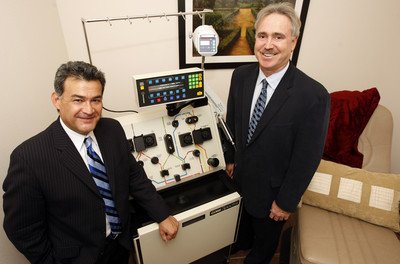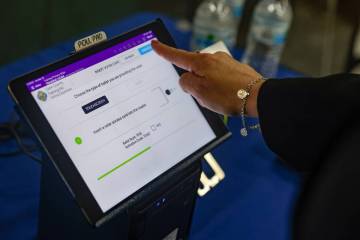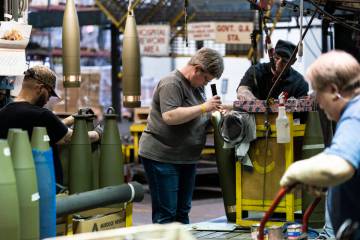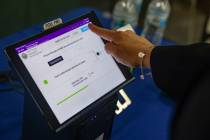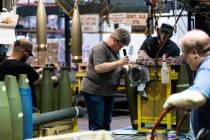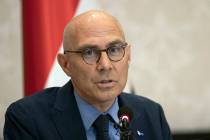Firm banks on stem cells
It's being pitched as a forward thinking approach to curing cancers and other diseases.
But the price tag is high, it's not covered by insurance, and there's no guarantee it'll work in the long run.
A New York biotechnology company, NeoStem, is the first firm in the Las Vegas Valley to provide a way for people to deposit and preserve some of their adult stem cells for future use.
"It's a concept that if proven viable will provide people with some alternative therapies,'' Michael Harter, vice president of administration at Touro University-Nevada, said about the storage of stem cells for future medical treatment. "There are lots of anecdotal cases showing significant improvements as a result of using adult stem cells to treat diseases.''
A stem cell is a cell that has the ability to self-replicate and develop into any kind of tissue in organs, skin or nerves. Its primary role is to maintain and repair the tissue in which it was found.
Most chronic diseases and conditions are linked to damaged, dead or malfunctioning tissue or cells, health officials say.
The collection process, which takes about three hours, is similar to donating platelets. Blood is extracted from one arm, run through a processing unit to remove the stem cells, and then re-injected into the arm. The removed stem cells are tested for bacteria, counted, split among vials and shipped to California, where they are frozen.
Though they don't expect their first Nevada client for a few more weeks, both Mark Weinreb, NeoStem's president, and Ivan Goldsmith, a Las Vegas internal medicine physician and medical director of NeoStem's Henderson office, believe there will be interest, even if the collection and storage have a hefty price tag.
According to NeoStem's enrollment agreement, clients pay a one-time $6,000 collection fee, $600 to $800 for a drug called neupogen, and a monthly storage fee of at least $37, depending on the plan.
Neupogen, given in two injections, mobilizes and increases the number of stem cells in the bloodstream, said Dr. Julio Guerra, director of marketing for NeoStem and a licensed pediatrician.
If an individual needs to withdraw stem cells -- which at this point would be for a clinical trial -- NeoStem requires written notice from a certified stem cell transplant physician. The notice will include the purpose for using the cells, Weinreb said.
So far, NeoStem has more than 40 clients. None has needed to withdraw stem cells, said Catherine Vaczy, vice president and general counsel for the company.
Though clients have access to the stem cells they've banked at any time, NeoStem anticipates it may keep the frozen cells in some cases for decades.
Whether the cells will be useful once they are thawed is unknown. Degradation of stem cells has been studied, but the data is preliminary.
The idea of storing stem cells isn't new to Nevada.
For years, stem cells have been extracted from bone marrow as well as cord blood, which is removed from the umbilical cord and placenta after a woman gives birth.
Cord blood stem cells have been used in the treatment of Hodgkin's disease, leukemia and sickle cell anemia.
Sharon Chayra, a spokeswoman for Cell Freeze Cord Blood Storage on West Sahara Avenue, said data show there is no erosion of cord blood once it is frozen. However, she said, "this is still early.''
Nevada researchers also are developing ways to harvest adult stem cells.
Led by Dr. Esmail Zanjani, chairman of biotechnology at the University of Nevada, Reno, researchers are injecting hundreds of sheep with adult human stem cells. The injections occurred while the sheep were embryos in the ewes.
The hope is that eventually human organs can be repaired as a result of the research on the "hybrid" sheep.
"People want to live longer and healthier lives, and they no longer accept that once they get heart disease or some other chronic illness that the only thing to treat them is defensive medicine,'' Goldsmith said. "This is about regenerative medicine.''
The U.S. government has invested tens of millions of dollars into more than 700 clinical trials through the National Institutes of Health utilizing adult stems cells, according to clinicaltrials.org, a federal Web site that links patients to medical research.
"This area (Las Vegas) is a great market,'' said Weinreb, who was in town this week to promote the opening of NeoStem's Henderson office.
The company also has collection facilities in New York, Pennsylvania and California.
As for the viability of frozen adult stem cells after a certain period of time, Vaczy said scientific data show that stem cells degrade approximately 5 percent in 30 years. She also said that based on some scientific evidence, adult stem cells that are frozen should be highly sufficient for transplant purposes over the course of one's lifetime.
"It's expensive, and insurance companies do not cover this. But you have to think of it as buying insurance for the future. People buy Rolex watches every day,'' Goldsmith said. "Somewhere down the road, you will probably need these stem cells. You won't need that watch.''
Like most new technologies though, Goldsmith said something that starts out expensive will drop in price as interest rises.
In addition, he noted, stem cell research is constantly changing, and this method of collection may become obsolete.
Contact reporter Annette Wells at awells@reviewjournal.com or (702) 383-0283.



